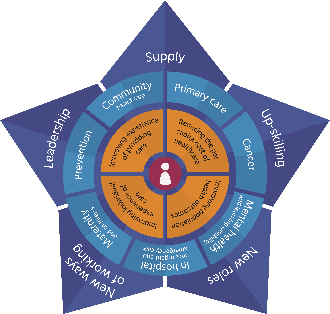You are here
News from Workforce Transformation

February 2021
HEE Star: proven to workforce redesign
The HEE Star is a definitive tool for any workforce redesign programme and Health Education England (HEE) has spent three years researching, building and refining the Star methodology and a set of accompanying resources to become the highly effective solution it has become today.
HEE commissioned health economists Economics By Design, to qualify and quantify the value to providers and systems of applying the HEE Star methodology to planning workforce redesign. Evidence drawn from multiple examples of use illustrate greater results in a shorter time period – saving time for senior leaders and clinicians, as well as generating the potential for faster and wider change, given the efficiency and breadth of the design process.
A significant workforce development agenda, led by HEE, is embodied in We are the NHS: People Plan for 2020/21 which is designed to tackle the gap between the growing demand for health care professional staff in England as well as address issues relating to existing and projected capacity. This has been turbo-charged by COVID-19.
In this most challenging of times understanding the value, relevance and use of the HEE Star has never been more important. We are now pump-priming capacity in systems to use the HEE Star, by training those leading workforce redesign to use the methodology locally.
Find out more about the HEE Star and its proven value to systems or contact the national HEE Workforce Transformation team at transformation@hee.nhs.uk
December 2020
Key themes for workforce redesign in Mental Health published
Healthcare innovators and leaders working with the National CLEAR Programme for Mental Health have published a report on twelve key themes to facilitate workforce redesign to better mental health services in the NHS.
Fifty colleagues with expertise in different areas of Mental Health workforce were interviewed and over sixty pieces of literature were reviewed and analysed to identify common opportunities to improve workforce design. Twelve key themes were identified which will provide a framework to enable real change in mental health services.
This research has informed the National CLEAR Programme for Mental Health, a Health Education England commissioned programme. CLEAR, which stands for Clinically-Led workforcE and Activity Redesign, provides expertise, training and modelling tools to equip clinicians with new skills to redesign workforce and care.
Kirstie Baxter, Head of Workforce Transformation at Health Education England said;
“These key themes enable us to better understand how we can support the mental health of our population through meeting workforce challenges. CLEAR allows those closest to care delivery to redesign workforce models to address the daily challenges they face.”
CLEAR projects for Mental Health will be commencing later this spring and will promote a multi-disciplinary, holistic approach to new ways of working within mental health services. Projects will run across the regions and cover individual areas of mental health including perinatal mental health, adult common mental illness (IAPT) and children and young people’s mental health.
See the full report in 'Related documents' at the foot of this page.
September 2020
Health Education England and the AHSN Network join forces to help support system partners in delivering innovation and transformation for the NHS workforce
An enterprising new partnership between Health Education England (HEE) and the AHSN Network is developing at pace.
After successful discussions, HEE and the AHSN network have agreed to share expertise and work together across several common priorities at national and regional level.
The AHSN’s bring proven expertise in supporting and facilitating the spread and adoption of evidenced innovation across healthcare pathways, as well as their well-established, place-based relationships across the country.
HEE brings a greater awareness of the national strategic growth plan for workforce transformation enshrined in We Are the NHS: People Plan 2020/21, sharing a range of proven methodologies, tools and enabling programmes along with its own, regionally-based knowledge and expertise and the already well established partnerships in relation to digital readiness.
One of the first areas of partnership will be the usage of the Star methodology – HEE’s model for workforce transformation. AHSN colleagues, having been trained in the methodology will then use the model to help system partners better understand and explore the workforce challenges implicit in embedding innovations within their pathway transformation work.
Kirstie Baxter, Head of Workforce Transformation at HEE said:
“The AHSN Network and HEE have agreed to collaborate on their joint and common usage of the HEE Star as the accepted methodology in supporting health and care partners to explore, shape and prioritise the workforce challenge into deliverable, project-based solutions.
HEE will train a cohort of experienced AHSN pathway transformation colleagues, who are specialists in this area, as both facilitators and trainers themselves. This really is an excellent opportunity to bring greater capacity to support systems address their workforce transformation challenges”.
Kathy Scott, Director of Operations and Deputy Chief Executive at Yorkshire and The Humber Academic Health Science Network added:
“The AHSNs, in their capacity in leading around innovation spread and adoption for the NHS, are particularly looking forward to utilising the HEE Star proven methodology and the online, best-practice directory to provide even more support to system partners at local, regional and ICS level to embed workforce transformation alongside complementary pathway innovation going forwards.”
Other common priority areas being pursued by the partnership for delivery to the system include, Digital Readiness, Patient Safety, Technology Enhanced Learning and Genomics.